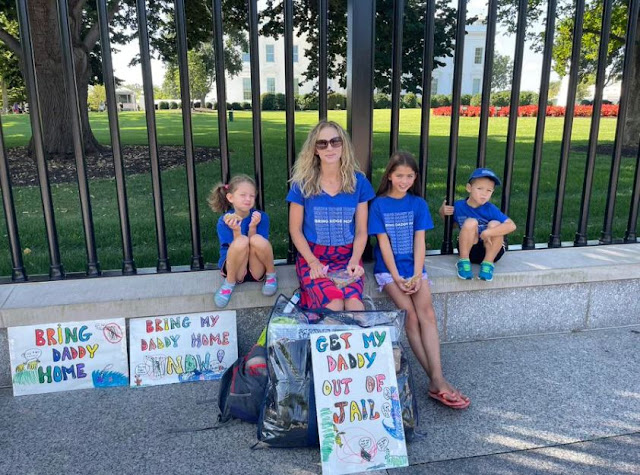Are you familiar with the case of Lieutenant Ridge Alkonis, USN?
Much to my shame, until this AM I was not. Let's get everyone up to speed. From Andrew Jeong at WaPo;
While stationed in Japan in May 2021, Alkonis was driving home with his family and their Australian labradoodle after a visit to Mount Fuji, near Tokyo. They had gone to an area about 8,000 feet high and accessible by car. After parking, the family hiked on a mostly flat trail for a few hours, Brittany Alkonis said. On their way home at 1 p.m., Ridge Alkonis was talking to his oldest daughter as he drove.
But mid-sentence, Alkonis suddenly fell unconscious, his family said. The vehicle, going about 25 mph, veered into a parking lot and crashed into several cars that were then pushed against two pedestrians: an 85-year-old woman and her 54-year-old son-in-law. They both died. A third person, a daughter of the elderly woman, was injured. Brittany Alkonis sustained an ankle injury.
When Ridge Alkonis awoke several minutes after the crash, witnesses said his face looked pale, his family said, citing police reports. His symptoms — paleness and a loss of consciousness — align with those of acute mountain sickness, which can affect people at altitudes above 8,000 feet, according to information published by the U.S. National Library of Medicine. In June 2021, a neurologist told Alkonis that he had suffered from the illness at the time of the crash, his family said.
A tragedy for everyone involved, especially those killed and injured - but also for Alkonis and his family. Unintentionally responsible for the death of others is something that will always be with a person - even if one is not at fault.
No one is at fault for an unexpected medical condition.
Accidents happen all the time due to medical emergencies with drivers. Many are familiar with drivers who are diabetic and run in to trouble while driving, not to mention heart attacks, strokes, and all manner of medical problems that come up with little notice. We are mortal beings. Both the background of the accident and the medical experts seem to agree that this is the case here - a tragic secondary effect of a medical emergency.
As those who have served overseas know, a service member's relationship with the host nation's legal system is bounded by the status of forces agreement with the host nation.
What did Japan decide in this case?
In October, Alkonis was sentenced to three years in jail for negligent driving. The judge overseeing the case said he had not traveled high enough to be afflicted with severe acute mountain sickness, according to local reports. Instead, she accepted prosecutors’ assertions that Alkonis had been drowsy that day. An appeal failed to overturn the verdict.
Alkonis’s family has accused Japanese investigators of misleading him into signing Japanese-language documents during his pretrial confinement that the family says inaccurately described Alkonis as having felt sleepy before driving that day. Alkonis was also denied access to an attorney during his initial four weeks of detention after the accident, according to his family.
That is what it is. How is he being treated relative to others?
Alkonis has repeatedly expressed sorrow over the deaths of the man and woman. His family, with help from friends, paid $1.65 million to the victims’ relatives as restitution, they said. “They are victims, 100 percent innocent. They are definitely victims,” Brittany Alkonis said in a phone interview this week.
But the family also says Ridge Alkonis received an unusually harsh punishment; 95 percent of Japanese citizens convicted of similar charges are granted suspended jail terms, according to Japanese Ministry of Justice data — meaning they aren’t sent to prison.
In 2019, of the 1,252 people charged with causing death through negligent driving, 4.6 percent — about 58 people — ended up serving prison time, according to a government white paper. The great majority — 95.4 percent — received a suspended sentence.
We cannot control the Japanese legal system, but there are things we can control.
LT Alkonis is married with three children who are still in Japan where he was stationed.
What is his Navy and his Defense Department doing to support him and his family?
The Defense Department will deny a plea from Navy Lt. Ridge Alkonis to extend his pay and allowances while he serves a three-year prison sentence in Japan, according to U.S. Sen. Mike Lee of Utah on Thursday.
During a speech from the Senate floor, Lee said he spoke Nov. 29 with Defense Secretary Lloyd Austin after three weeks of requests for a phone call. Lee said he asked Austin for an update on the request for an exception to policy Alkonis made in June to keep his benefits flowing when his leave runs out at the end of this month.
Without Alkonis’ pay, his wife, Brittany Alkonis, and their children, still living in Japan, would be “kicked to the curb” at Christmastime, Lee, a Republican, said during his 23-minute speech on the Navy lieutenant’s plight.
“Secretary Austin callously informed me that day that the request for the exception to policy would not be granted,” Lee said. “I asked him why. He believed it wasn’t appropriate for the department to do that.”
Why is there a level of cynicism towards Navy leadership specifically and the military leadership in general by those who are serving? Why do you have some veterans discouraging family members from following their example and join the military - or if they do - tell stories like this as a warning that things are not what they may think?
We make a big deal out of family support. I'm thinking hard why we as an institution shouldn't stand up and support the Alkonis family right now.
Just look at this story and imagine this is your family, your friend, your Shipmate.
h/t Kurt.


No comments:
Post a Comment